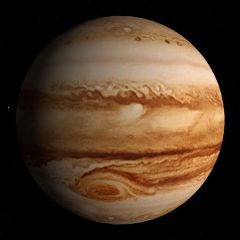Difference between revisions of "List of surface features on Mercury"
(Io table.) |
(Jupiter) |
||
| Line 1: | Line 1: | ||
| − | {| cellpadding="2" cellspacing="0" style="margin:25px 0 0 10px; border:3px solid lightsteelblue;width:250px; font-size:90%; font-family:'Arial','Helvetica'; float: right; clear: right; | + | {| cellpadding="2" cellspacing="0" style="margin:25px 0 0 10px; border:3px solid lightsteelblue;width:250px; font-size:90%; font-family:'Arial','Helvetica'; float: right; clear: right;" |
| − | !bgcolor="lightsteelblue" colspan="2" align="center" | | + | !bgcolor="lightsteelblue" colspan="2" align="center" |Jupiter |
|- | |- | ||
| − | |colspan="2" align="center"|[[Image: | + | |colspan="2" align="center"|[[Image:JupiterScrshot.jpg|240px]] |
|- | |- | ||
| − | |colspan="2" align="center"|''' | + | |colspan="2" align="center"|'''Jupiter in Orbiter''' |
|- | |- | ||
!bgcolor="lightsteelblue" colspan="2"|Designation | !bgcolor="lightsteelblue" colspan="2"|Designation | ||
|- | |- | ||
| − | |width="30%"|Name||align="right" width="30%"| | + | |width="30%"|Name||align="right" width="30%"|Jupiter |
|- | |- | ||
| − | |width="30%"|Reference body||align="right" width="30%"| | + | |width="30%"|Reference body||align="right" width="30%"|Sun |
|- | |- | ||
| − | |width="30%"|Number of satellites||align="right" width="30%"| | + | |width="30%"|Number of known satellites||align="right" width="30%"|79 |
|- | |- | ||
!bgcolor="lightsteelblue" colspan="2"|Physical parameters* | !bgcolor="lightsteelblue" colspan="2"|Physical parameters* | ||
|- | |- | ||
| − | |width="30%"|Mass||align="right" width="50%"| | + | |width="30%"|Mass||align="right" width="50%"|1.899×10<sup>27</sup> kg |
|- | |- | ||
| − | |width="30%"|Mean Radius||align="right" width="50%"| | + | |width="30%"|Mean Radius||align="right" width="50%"|6.991×10<sup>7</sup> m |
|- | |- | ||
| − | |width="30%"| | + | |width="30%"|Gravitational moments||align="right" width="50%"|J<sub>2</sub>=0.0147 |
|- | |- | ||
| − | |width="30%"| | + | |width="30%"|Siderial day||align="right" width="30%"|1.35×10<sup>4</sup> s |
| − | |||
| − | |||
|- | |- | ||
|width="30%"|Atmosphere||align="right" width="30%"|Yes | |width="30%"|Atmosphere||align="right" width="30%"|Yes | ||
| Line 32: | Line 30: | ||
|width="30%"|Atmosphere model||align="right" width="30%"|Generic | |width="30%"|Atmosphere model||align="right" width="30%"|Generic | ||
|- | |- | ||
| − | |width="30%"|Surface | + | |width="30%"|Surface pressure||align="right" width="30%"|2.014 MPa |
|- | |- | ||
| − | |width="30%"|Surface | + | |width="30%"|Surface density||align="right" width="30%"|1.329 kg/m<sup>3</sup> |
|- | |- | ||
| − | |width="30%"|Specific gas constant||align="right" width="30%"| | + | |width="30%"|Specific gas constant||align="right" width="30%"|194.92 J/(K kg) |
|- | |- | ||
| − | |width="30%"|Specific heat ratio||align="right" width="30%"| | + | |width="30%"|Specific heat ratio||align="right" width="30%"|1.33 |
|- | |- | ||
!bgcolor="lightsteelblue" colspan="2"|Osculating elements (ecliptic frame)* | !bgcolor="lightsteelblue" colspan="2"|Osculating elements (ecliptic frame)* | ||
|- | |- | ||
| − | |width="30%"|Semi-major axis||align="right" width="30%"| | + | |width="30%"|Semi-major axis||align="right" width="30%"|7.7858×10<sup>11</sup> m |
| − | |||
| − | |||
| − | |||
| − | |||
|- | |- | ||
| − | |width="30%"| | + | |width="30%"|Eccentricity||align="right" width="30%"|0.048851 |
|- | |- | ||
| − | |width="30%"| | + | |width="30%"|Inclination||align="right" width="30%"| 1.30° |
|- | |- | ||
| − | |width="30%"|Note||align="right" width="30%"|*Elements | + | |width="30%"|Note||align="right" width="30%"|*Parameters and Elements are from Orbiter 2016 |
|} | |} | ||
| + | |||
| + | Head | ||
| + | Physical characteristics | ||
| + | Rotation and orbit | ||
| + | Bases | ||
| + | Natural satellites | ||
| + | See also | ||
| + | |||
| + | |||
| + | |||
| + | '''Jupiter''' is the 5th planet from the [[Sun]] and is the largest of the planets. | ||
| + | |||
| + | == Physical characteristics == | ||
| + | Jupiter is the largest of the planets, a gas giant consisting of mostly hydrogen and helium, its mean radius is about 69910 km, and its volume would contain about 1000 earths. The mass of Jupiter is 1.899×10<sup>27</sup> kg | ||
| + | |||
| + | ==Natural satellites== | ||
| + | As of January 2021, Jupiter has 79 known natural satellites, a number of which are available in the Outer Planets Add-on available at [https://www.orbithangar.com Orbit Hangar], but only [[Io]], [[Europa]], [[Ganymede]], and [[Callisto]] comes with the stock Orbiter2016. | ||
| + | {{JupiterSat}} | ||
| + | |||
| + | == See also == | ||
| + | [w:Jupiter|Jupiter]] at Wikipedia | ||
| + | [[:Category:Addons for Jupiter|Addons for Jupiter]] | ||
| + | |||
| + | [[Category:Celestial bodies]] | ||
| + | |||
| + | {{SolarSystem}} | ||
| + | {{Planet-Stub}} | ||
| + | |||
| + | [[Category:Solar System]] | ||
| + | [[Category: Planets]] | ||
Revision as of 12:11, 24 June 2021
Head Physical characteristics Rotation and orbit Bases Natural satellites See also
Jupiter is the 5th planet from the Sun and is the largest of the planets.
Physical characteristics
Jupiter is the largest of the planets, a gas giant consisting of mostly hydrogen and helium, its mean radius is about 69910 km, and its volume would contain about 1000 earths. The mass of Jupiter is 1.899×1027 kg
Natural satellites
As of January 2021, Jupiter has 79 known natural satellites, a number of which are available in the Outer Planets Add-on available at Orbit Hangar, but only Io, Europa, Ganymede, and Callisto comes with the stock Orbiter2016.
See also
[w:Jupiter|Jupiter]] at Wikipedia Addons for Jupiter
| edit The Solar System | |
|---|---|
| Central star |
Sun (Sol) |
| Planets |
Mercury - Venus - Earth - Mars - Jupiter - Saturn - Uranus - Neptune |
| Natural satellites |
Moon - Phobos - Deimos - Io - Europa - Ganymede - Titan - more... |
| Add-ons |
Planets - Dwarf Planets - Small objects - Natural satellites - Alternative star systems |
 | This article, about a planet, is a stub. You can help Orbiterwiki by expanding it. |
